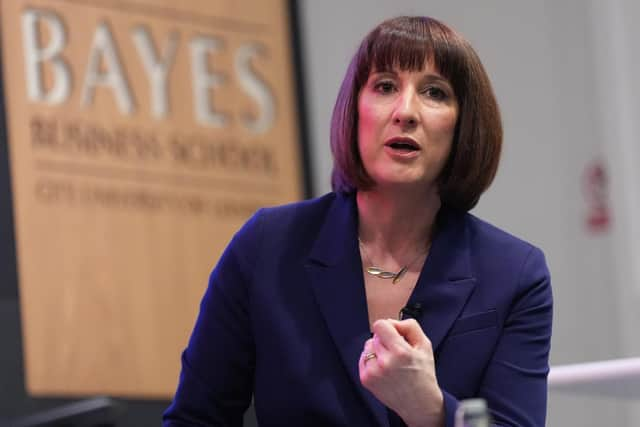Is Rachel Reeves a cautious conservative or a radical reformer? - Bill Carmichael
This week she dampened expectations of what a future Labour government can achieve when she said they wouldn’t be able turn things around “straight away” after what looks likely to be victory in the coming General Election in the second half of this year.
A few days later, in a keynote speech in the City of London, she sounded much more upbeat, promising “a new chapter in Britain’s economic history”, with sweeping reforms of the Treasury, and likening the challenges faced by the next incoming government to those faced by Margaret Thatcher in 1979.
Advertisement
Hide AdAdvertisement
Hide AdSo, what is she? A cautious conservative (note the small c), or a radical reformer? It is hard to tell at the moment, and I suspect we won’t see her true colours until after she is safely ensconced in Number 11 Downing Street.


That is because being suitably equivocal about future economic plans suits the Labour Party perfectly right now. With the Conservatives tearing themselves apart, Labour has to do little other than look vaguely competent, and there is currently no need for detailed economic targets.
Ms Reeves was giving the prestigious Mais Lecture to City financiers earlier this week when she pledged an economic take-off similar to the Thatcher years with an emphasis on growth-led policies.
She proposed creating a unit focusing on growth and high productivity to inform key decision making for Budgets and spending reviews. She said the aim is to promote business investment and long-term growth through a more “active government”.
Advertisement
Hide AdAdvertisement
Hide AdSaying you are “pro-growth” is a bit like saying you are in favour of motherhood and apple pie. No one, other than a few green and far left cranks, disagrees that growth, and increasing prosperity, is a good thing. It makes people’s lives more comfortable, helps the poor, provides more taxes for better public services, and reduces our total debt as a proportion of GDP.
And it is clear that in the UK growth has been sluggish or stagnant for far too long, and in the last two quarters we entered a technical recession.
So everyone from Rachel Reeves, to Jeremy Hunt, and Liz Truss, all agree that growth is a good thing. The difficult thing is to work out how to get there, and Labour is unlikely to provide that level of detail before the General Election.
But Ms Reeves has clearly been studying Thatcher’s time in government, and she should learn the lesson that one of the most powerful tools the state has to promote growth is tax cuts. Tax cuts put more money in people’s pockets, boosting spending, creating jobs, and increasing the government’s tax take.
Advertisement
Hide AdAdvertisement
Hide AdNigel Lawson, who died last year, understood this. He became Chancellor of the Exchequer in 1983 after Mrs Thatcher won her second term as Prime Minister, and embarked on radical tax cuts that put a rocket booster on the British economy.
He cut the basic rate of income tax from 29 to 25 per cent, and cut the highest rate to 40 per cent. The result was growth rates of more than 4 per cent (simply unthinkable today when the forecast for the current year is around 0.7 per cent) and halving unemployment from three million by the end of 1989.
It wasn’t all plain sailing, of course. There was a massive house price boom, and inflation started to rise leading to a rise in interest rates, and eventually a sharp end to the years of plenty.
But the message still stands - judicious tax cuts can lead to healthy economic growth, so long as inflation is carefully watched and curbed if necessary.
Advertisement
Hide AdAdvertisement
Hide AdWill Ms Reeves learn this lesson? I am not convinced. Labour governments have not been known for cutting taxes - quite the opposite. And it would be a brave Labour Chancellor who tried to recreate the Lawson Boom.
The current Conservative government has hardly covered itself in glory in terms of tax, having pushed up the burden to its highest for 70 years, partly excused by the economic shocks delivered by the pandemic and the war in Ukraine.
But at least, with the recent 4 per cent cut in National Insurance, Rishi Sunak and his Chancellor, Jeremy Hunt, are heading in the right direction.
Voters who want lower taxes, smaller government and political and economic liberty are not served well by the current crop of political parties, but the Conservatives, poor as their record is, may still be a better bet than Labour.
Comment Guidelines
National World encourages reader discussion on our stories. User feedback, insights and back-and-forth exchanges add a rich layer of context to reporting. Please review our Community Guidelines before commenting.